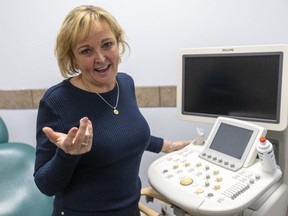Homeless women receiving prenatal care at new London clinic
A new partnership between the region’s largest hospital and a front line health care agency is bringing prenatal care to the city’s homeless population, vital medical care previously out-of-reach for many of London’s most marginalized.

Article content
A new partnership between the region’s largest hospital and a front-line health care agency is bringing prenatal care to the city’s homeless population, vital medical care previously out-of-reach for many of London’s most marginalized.
The London InterCommunity Health Centre is launching a bi-weekly obstetrics clinic at its Dundas Street location, a partnership with London Health Sciences Centre (LHSC) to address the community need.
“In some cases, we are meeting women who are 25 and even 30 weeks pregnant who had had no care. We were finding them in encampments during outreach. Some were new to town or people who have had bad experiences with health care,” said Greg Nash, LIHC’s director of program development and complex urban health.
“They weren’t getting the level of care they need or deserve.”
The number of pregnant patients seen by LIHC fluctuates, Nash said, but it can be upward of two dozen at any given time. The obstetrics clinic is intended to serve the city’s marginalized populations, including unhoused and precariously housed Londoners and ones involved in sex work.
In the past, LIHC would refer pregnant patients to the hospital for specialized obstetrics care, said Laura Lyons, medical director of family medicine obstetrics at LHSC. But there were significant financial, logistical and mental health barriers that kept many vulnerable people from getting to their hospital appointments, she said.
“We knew it was a problem. A number of these women were not getting the health care that they needed for them and their babies,” Lyons said.
Lyons, who has been seeing patients referred to her by LIHC for many years, brought the idea of the partnership to hospital leadership and said they immediately jumped at the opportunity.
LHSC has donated two ultrasound machines to the Dundas Street facility and will hold an obstetrics clinic at the site every other week, staffed by doctors who work at the hospital. The clinic has had two dates already and is in the process of ramping up, Lyons said.
“Everybody has joined in with a lot of enthusiasm and it’s amazing how quickly things have happened,” she said.
The new clinic means patients can get the specialized obstetrics care they need in a familiar space and build trust with its staff for when they give birth at the hospital, she said.
The partnership just made sense to LHSC and the strategic direction it is going in, Brad Campbell, corporate hospital administrative executive, said Wednesday.
LHSC was updating its in-hospital ultrasound fleet anyway, so donating the two machines to the LIHC clinic was a no-brainer, Campbell said. The hospital-supported obstetrics clinic also is a way to enhance what LIHC – already a well-used community resource – offers patients, he said.
“We’ve said we need to show up differently and partner differently. We need to work to move that care delivery, where it’s possible, into the community and where the people are,” Campbell said.
Providing prenatal care to the city’s marginalized is more than just a medical necessity, Lyons said, it’s an opportunity to reach women at a critical point in their lives and help them move in a new direction.
“One of the reasons that I got involved in providing care to these patients is because it is an amazing opportunity to support women at a time in their life when they’re ready for transition,” Lyons said.
“For women that have been in unstable situations, perhaps struggling with addiction when they’re pregnant, this is a time when they want to make a life change. It’s a very important time to be able to provide wrap-around supportive care to these patients because they are very motivated to make a change.”
Postmedia is committed to maintaining a lively but civil forum for discussion. Please keep comments relevant and respectful. Comments may take up to an hour to appear on the site. You will receive an email if there is a reply to your comment, an update to a thread you follow or if a user you follow comments. Visit our Community Guidelines for more information.